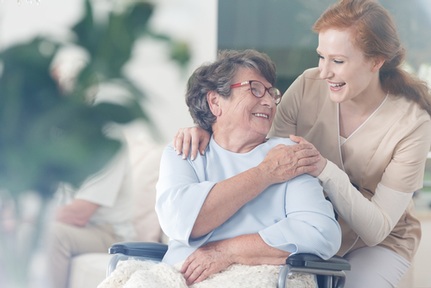People moving into care homes in England will no longer have to self-isolate on arrival
New care home residents in England no longer have to self-isolate for 14 days on arrival at the home and residents can now stay overnight with family and friends.

The new guidance by the Department for Health and Social Care also states that every care home resident can nominate an ‘Essential Care Giver’ to give additional care and support.
The ‘Essential Care Giver’ will be able to continue visits during periods of isolation or if there is an outbreak of COVID-19 in the home. The nominated family member or friend will have the same access to PPE and testing as care home workers.
Minister for Care, Helen Whately said: "I have heard first-hand from those living and working in care homes how difficult the restrictions around visiting have been and I’m incredibly grateful to everyone working in the sector who has helped reunite families safely.
“Thanks to the continued success of the vaccine rollout, I am pleased we can now take another step towards normality, helping more people enjoy visits out of the care home while protecting them from the continued risk of COVID-19.”
At the moment residents can only leave the care home for a visit if it is outdoors or for high-priority reasons, such as a dental or GP appointment, but will now be able to leave the home for more social reasons without having to isolate.
From 21 June, new people coming to live in a care home will no longer have to self-isolate for 14 days on arrival.
However they will have to undergo an enhanced testing regime - a PCR test before admission, a PCR test on the day of admission and a further PCR test seven days later.
'Will bring a sense of normality one step closer'
Vic Rayner, chief executive of the National Care Forum, the leading association for not-for-profit care providers, welcomed the new guidance, saying: “The clear statement by government outlining that each and every care home resident should have access to an essential care giver is an important step in ensuring that all residents are supported by those who are most important to them through any further restrictions or outbreaks.
“The vital connection between residents and their loved ones has been broken for too long for many people, and this guidance will bring a sense of normality one step closer for those most impacted by this pandemic.”
She added that the move to no longer require new care home residents to self-isolate “will have a huge impact on people who need care and their families”.
Visits that are deemed to be high risk, such as an overnight stay at a hospital, will still require a 14 day isolation period after returning to the care home.
If a person is admitted from a hospital or another care home they must also self-isolate.
In response to this, John’s Campaign, which fights for families to be given the right to visit relatives when they are unwell in hospital or care settings, said: “Where is the legal justification for isolating people who have not tested positive and have not consented? That's unlawful imprisonment.”
Care homes need to carry out individual risk assessments
• Care homes will need to conduct individual risk assessments to ensure visits out are not high risk. This will take into account the number of nights the resident plans to stay out of the home.
• Decisions about an individual resident’s visits outside of a care home should be taken with the resident’s assessed needs and circumstances considered. The care home should balance the benefits of visits out of the care home against a consideration of the risks to others in the home, where necessary.
• Individual risk assessments should take into account:
o The vaccination status of residents, visitors and staff
o Levels of infection in the community
o Variants of concern in the community
o Where the resident is going on a visit and what activities they will take part in whilst on the visit
o The mode of transport residents intend to use
Latest News
 29-Jul-24
Dementia Bus gives carehome.co.uk staff insight into life with dementia
29-Jul-24
Dementia Bus gives carehome.co.uk staff insight into life with dementia
 01-Mar-24
Find out the top care homes in 2024
01-Mar-24
Find out the top care homes in 2024
 21-Mar-23
UK's top care homes in 2023 revealed
21-Mar-23
UK's top care homes in 2023 revealed
 03-Jan-23
carehome.co.uk launches free care helpline
03-Jan-23
carehome.co.uk launches free care helpline
 13-Dec-22
5 mins with Emily Whitehurst, chief operating officer for Constantia Healthcare
13-Dec-22
5 mins with Emily Whitehurst, chief operating officer for Constantia Healthcare